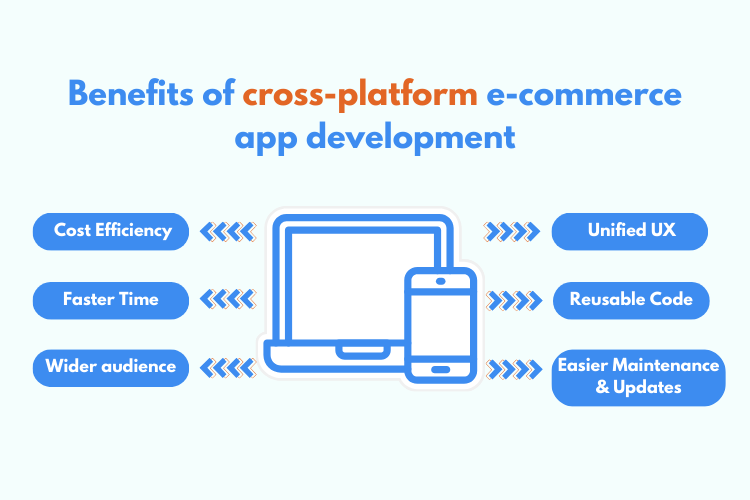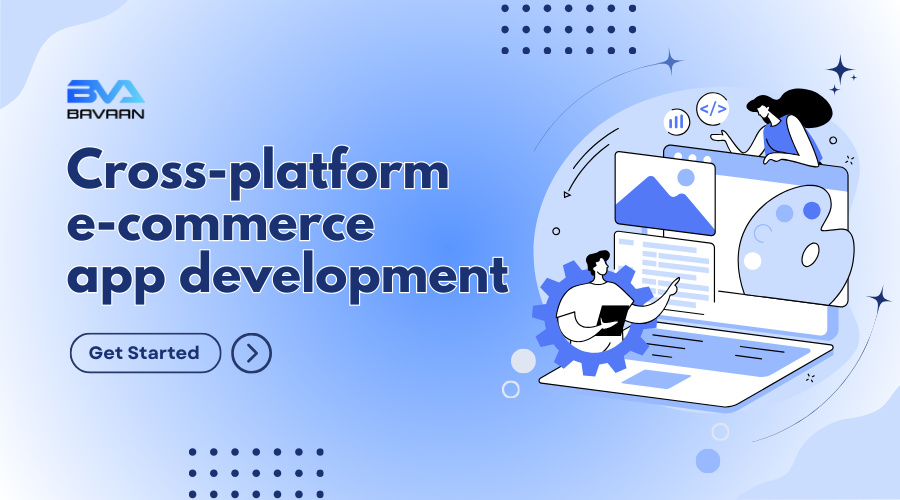The e-commerce industry is growing at an unmatched rate, so the call for a smooth cross-platform e-commerce app experience is on the rise.
This post identifies some of the key obstacles faced during Cross-platform E-commerce App Development. It suggests practical solutions that help businesses overcome them to realize high-performance secure and user-friendly apps on all devices.
Businesses in an increasingly interconnected world anticipate easy browsing, shopping, and payment using all gadgets including iPhone, Android, or web browsers. Creating an e-commerce app that performs consistently well on various operating systems presents some unique challenges.
I. Benefits of cross-platform e-commerce app development
For businesses wishing to maximize market reach but maintain high quality and performance standards on all mobile platforms, cross-platform app development services offer a wide range of benefits for e-commerce. Here are those as follows.
1.1. Cost Efficiency
One key advantage associated with cross-platform e-commerce app development is its cost efficiency. Creating an app that runs on different platforms at the same time leads to the elimination of the necessity for individual development teams and processes for all platforms involved (iOS, Android, etc). All these factors have served to reduce development costs making this a good choice for businesses especially startups and small to medium-sized enterprises.
1.2. Faster Time to Market
One of the key advantages of cross-platform app development in developing e-commerce apps is that it takes less time for one to launch them as much code is reused between various OS types. Instead of developing two or more different codebases; programmers may concentrate on one Android app that supports all OSs. Therefore, it enables enterprises to reach out to their target groups using different gadgets within no time which is crucial in the dynamic online selling space.
1.3. Wider audience
With cross-platform e-commerce app development, there is no need for separate apps to target both iOS and Android users, hence the larger user base. If you want your customers to be everywhere then consider developing multi-platform applications.
1.4. Unified User Experience
Cross-platform frameworks enable developers to deliver a consistent user experience across platforms while still retaining platform-specific customization options. When it comes down to e-commerce platforms this kind of design and feature consistency helps guarantee a seamless shopping process on any device used by customers thereby improving satisfaction among them
1.5. Easier Maintenance & Updates
Handling one code base for all platforms means that it is much easier to maintain and update apps. Makers will only have to make any alterations once and they will reflect across the board. This simplifies not only bug fixes and feature enhancements but also ensures that updates of new app versions are done similarly reducing the possibilities of inconsistencies among different platforms while at the same time providing quicker adaptability to market changes and OS upgrades.
1.6. Reusable Code
Due to the reusable nature of code in cross-platform e-commerce app development, the programmer can write once and use it again on other platforms. This ensures quick iterations, enhancements, and upgrades inevitably saving time and resources.

II. Major challenges and solutions
In the realm of cross-platform e-commerce app development, businesses often encounter significant hurdles that can impact the app’s performance, user experience, and security. Understanding these challenges and implementing effective solutions is crucial for creating successful apps that meet user expectations and function seamlessly across various devices and operating systems. This section explores some of the most common obstacles developers face and provides practical strategies to overcome them.
Challenge 1: User Interface (UI) and User Experience (UX) Consistency
This presents one of the major challenges when developing cross-platform e-commerce app. A single app is likely to look and behave differently across devices because various operating systems like iOS and Android possess unique design guidelines and user expectations.
- Solution:
Developers should adhere to platform-specific design guidelines while using reusable components ensuring performance optimization on all operating systems so that every time you interact with an app on different devices it looks the same way. By doing this, application developers make sure that their applications would perform consistently on all devices.
Challenge 2: Platform-Specific Performance Optimization
Even cross-platform e-commerce app allow for a single codebase. Compared to native apps, cross-platform tools often lead to slower performance. When it comes to platform-specific features, animations such as those in payment gateways, inventory management can be complex.
- Solution:
Developers may handle this concern by integrating native code for performance-critical sections where necessary. You need to hire mobile app developers that specialize in platform-specific technologies & frameworks. Alternatively, this hybrid model allows developers to take advantage of native component optimization without sacrificing the task load efficiency provided by cross-platform frameworks.
Challenge 3: Security Considerations
E-commerce mobile shopping apps are more prone to security risks compared to other applications since they usually treat private user information including but not limited to personal data, payment details, and transaction history with high confidential esteem, thus exposing them greatly. Therefore, the development of robust multi-platform security while managing app performance presents a big challenge.
- Solution:
In response, it is necessary for online shopping mobile application developers to adopt end-to-end encryption mechanisms that beat industry standards as well as multilayer verification practices such as Multi-Factor Authentication (MFA) across all platforms together with Secure Socket Layer (SSL) certificates. Alternatively, regular updates are essential from vulnerability patches to secure APIs thereby adhering to rules on data safety through GDPR.

Challenge 4: Integration With Third-Party Services.
In most cases; integration with different third-party services like payment gateways, inventory management systems, or CRM tools is required by cross-platform e-commerce apps. Platform-specific APIs and plugins can make integration complex as it may act differently on various operating systems.
- Solution:
To overcome this, developers have to leverage well-documented APIs that support cross-platform functionality. To ensure there is no conflict during the integration process, the app should be tested entirely on all platforms. Testing apps extensively on multiple devices helps identify early problems with compatibility issues arising from different systems.
Challenge 5: Maintenance and Updates
Keeping a cross-platform e-commerce app up to date with new operating system versions, feature upgrades, and bug fixes can be difficult particularly if you are dealing with multiple platforms. Moreover, ensuring timely maintenance without sacrificing the user experience requires planning before any update is initiated.
- Solution:
Modular app development allows updates to be broken down into smaller chunks. Core app functionality can be separated from platform-specific code so that only parts need to be updated without affecting the entire application at once. Automated tests aid in identifying and correcting bugs across all these platforms efficiently hence allowing an updated app to run smoothly each time it’s released.

Conclusion
No doubt, cross-platform e-commerce app development is a great strategy for businesses that want to provide seamless and consistent shopping experiences across multiple devices. However, it’s not without its challenges.
In the end, addressing these challenges head-on with well-thought-out solutions enables businesses to provide superior user experiences while cutting down on costs, time to market, and scalability issues in the future- setting the stage for sustainable growth and innovation in the e-commerce industry.
Author Bio
Ishan Gupta is the CEO and Co-founder of RipenApps, a leading web and mobile app development company specializing in Android and iOS app development. Deploying feature-loaded mobile & web app solutions to SMBs globally transforms business all around.



